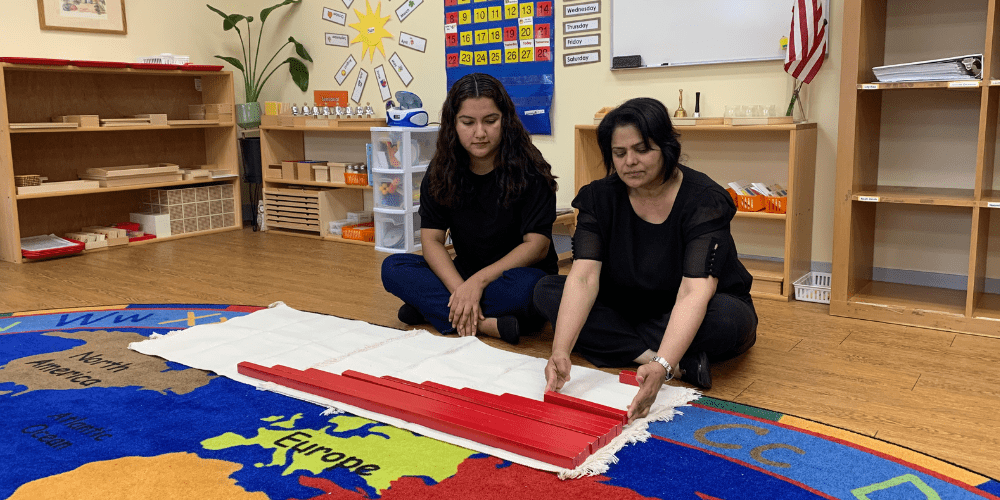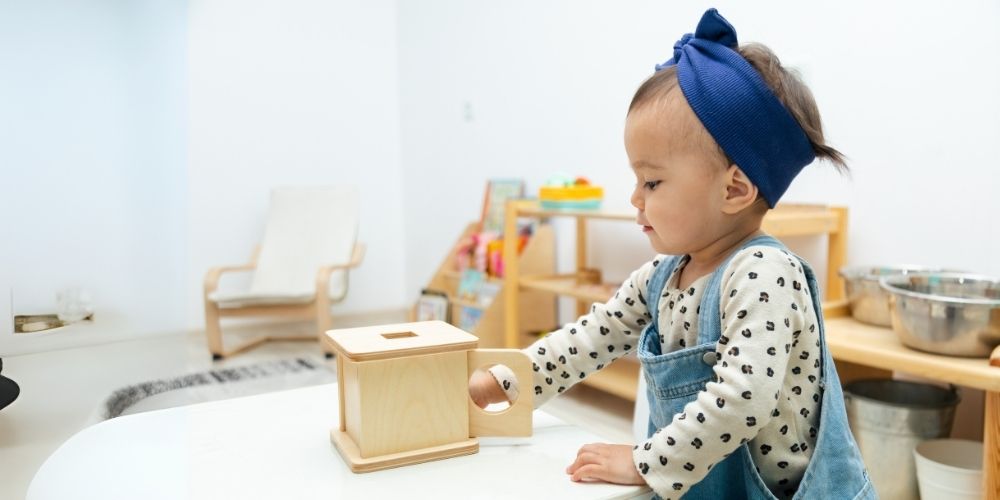About
Infant Daycare Program
Our Montessori-based Infant daycare program ensures a nurturing, safe, and healthy environment. Our program is also a place where children feel loved and are encouraged to explore their environment. Unlike traditional daycare, our programs focuses on development of the whole child.
Toddlers Daycare Program
Our Toddler daycare program helps children develop their cognitive skills, motor skills, sensory skills, language skills, practical life skills, and social skills. Toddlers at our schools will also begin their transition into the Pre-primary preschool classroom. For instance, they do this by working with activities from the five Montessori areas of Language, Math, Practical Life, Sensorial and Cultural Studies.Daycare Schedule
Curriculum
Daycare Schedule
Infants Schedule
Children Arrive
- Greeting
- Routine Care (feeding, diapering, sleeping)
- Self-directed activities in learning areas
- Circle time (Music & Movement, Calendar and Story Time)
Mid-Morning
- Nap for some, routine care for others
- Planned play: teacher-directed activities for some, self-directed for others
- Outdoor walk/play
Late Morning
- Lunch
- Nap for some, routine care for others
- Teacher-directed activities for infants who are awake
Mid-Afternoon
- Routine care
- Nap for some
- Teacher-directed activities for infants who are awake
- Outdoor walk/play
Late Afternoon
- Songs, finger play, music and movement, story time
- Self-directed activities in learning areas
- Routine care
Toddlers Schedule
Children Arrive
- Greeting
- Routine Care (breakfast, diapering/potty)
- Self-directed activities in learning areas
- Circle time (Music & Movement, Calendar and Story Time)
Mid-Morning
- Planned Play: teacher-directed activities for some, self-directed for others
- Snack
- Outdoor play
Late Morning
- Lunch
- Nap for some
- Teacher-directed activities for toddlers who are awake
Mid-Afternoon
- Routine care
- Snack
- Teacher-directed activities for some, self-directed for other
- Outdoor play
Late Afternoon
- Songs, finger play, music and movement, story time
- Self-directed activities in learning areas
- Routine care
Curriculum
Infants Program
Cognitive Skills
Focusing on an object; developing a concept of size, color and location. Also working on identifying and matching simple objects and their parts.
Motor Skills
Rolling over, grasping objects, developing the pincer grip, putting shapes into holes, stacking assorted objects, pouring dry material from one container to another.
Sensory Skills
Following movement with the eyes, experiencing different sounds and textures, recognizing patterns. Also, exploring objects in nature, and knowing “warm” and “cold.”
Practical Life Skills
Using basic eating utensils, caring for the environment by cleaning spills, wiping a table, etc. Also caring for self- pouring water, wiping nose, drinking out of a cup.
Language Skills
Naming and identifying objects and pictures to expand vocabulary. Also adding sound effects to stories; following simple directions; identifying objects from their description; and introducing numbers.
Social Skills
Imitating facial expressions and sounds, reaching out and touching objects, recognizing songs and anticipates actions, developing cooperation, interacting with others.
Toddlers Program
Sensory Skills
Identifying colors and matching pairs of objects by color, and identifying and matching objects by pattern and texture. Also identifying different sounds and smells.
Motor Skills
Developing hand-eye coordination, manual dexterity- stringing objects together, placing/removing objects from a certain place. Also transferring objects using the pincer grip.
Cognitive Skills
Developing matching skills, assembling simple puzzles, knowing shapes, and identifying objects that belong to a specific group. Also understanding sequence of events, knowing symbols used for numbers, and focusing on a moving object.
Practical Life Skills
Unrolling and rolling a work mat, sorting and matching objects, caring for the environment by cleaning spills, sweeping, etc. Also caring for self- cutting food into pieces, setting places for meals, pouring liquid from one container to another.
Language Skills
Developing and expanding vocabulary (ten basic body parts, naming colors and pictures in books, practicing basic counting, developing awareness of phonetic sounds, and adding/taking away identical objects).
Social Skills
Practicing sharing and taking turns, watching and imitating body movements, listening to and following directions. Also identifying and naming other children, matching photos to people, and recognizing feelings.
Daycare Schedule
Infants Schedule
Children Arrive
- Greeting
- Routine Care (feeding, diapering, sleeping)
- Self-directed activities in learning areas
- Circle time (Music & Movement, Calendar and Story Time)
Mid-Morning
- Nap for some, routine care for others
- Planned play: teacher-directed activities for some, self-directed for others
- Outdoor walk/play
Late Morning
- Lunch
- Nap for some, routine care for others
- Teacher-directed activities for infants who are awake
Mid-Afternoon
- Routine care
- Nap for some
- Teacher-directed activities for infants who are awake
- Outdoor walk/play
Late Afternoon
- Songs, finger play, music and movement, story time
- Self-directed activities in learning areas
- Routine care
Toddlers Schedule
Children Arrive
- Greeting
- Routine Care (breakfast, diapering/potty)
- Self-directed activities in learning areas
- Circle time (Music & Movement, Calendar and Story Time)
Mid-Morning
- Planned Play: teacher-directed activities for some, self-directed for others
- Snack
- Outdoor play
Late Morning
- Lunch
- Nap for some
- Teacher-directed activities for toddlers who are awake
Mid-Afternoon
- Routine care
- Snack
- Teacher-directed activities for some, self-directed for other
- Outdoor play
Late Afternoon
- Songs, finger play, music and movement, story time
- Self-directed activities in learning areas
- Routine care
Curriculum
Infants Program
Cognitive Skills
Focusing on an object; developing a concept of size, color and location. Also working on identifying and matching simple objects and their parts.
Motor Skills
Rolling over, grasping objects, developing the pincer grip, putting shapes into holes, stacking assorted objects, pouring dry material from one container to another.
Sensory Skills
Following movement with the eyes, experiencing different sounds and textures, recognizing patterns. Also, exploring objects in nature, and knowing “warm” and “cold.”
Practical Life Skills
Using basic eating utensils, caring for the environment by cleaning spills, wiping a table, etc. Also caring for self- pouring water, wiping nose, drinking out of a cup.
Language Skills
Naming and identifying objects and pictures to expand vocabulary. Also adding sound effects to stories; following simple directions; identifying objects from their description; and introducing numbers.
Social Skills
Imitating facial expressions and sounds, reaching out and touching objects, recognizing songs and anticipates actions, developing cooperation, interacting with others.
Toddlers Program
Sensory Skills
Identifying colors and matching pairs of objects by color, and identifying and matching objects by pattern and texture. Also identifying different sounds and smells.
Motor Skills
Developing hand-eye coordination, manual dexterity- stringing objects together, placing/removing objects from a certain place. Also transferring objects using the pincer grip.
Cognitive Skills
Developing matching skills, assembling simple puzzles, knowing shapes, and identifying objects that belong to a specific group. Also understanding sequence of events, knowing symbols used for numbers, and focusing on a moving object.
Practical Life Skills
Unrolling and rolling a work mat, sorting and matching objects, caring for the environment by cleaning spills, sweeping, etc. Also caring for self- cutting food into pieces, setting places for meals, pouring liquid from one container to another.
Language Skills
Developing and expanding vocabulary (ten basic body parts, naming colors and pictures in books, practicing basic counting, developing awareness of phonetic sounds, and adding/taking away identical objects).
Social Skills
Practicing sharing and taking turns, watching and imitating body movements, listening to and following directions. Also identifying and naming other children, matching photos to people, and recognizing feelings.
Program Locations
Request Information
[vc_row css_animation=”” row_type=”row” use_row_as_full_screen_section=”no” type=”full_width” angled_section=”no” text_align=”left” background_image_as_pattern=”without_pattern”][vc_column][qode_advanced_image_gallery type=”slider” enable_image_shadow=”no” space_between_items=”medium” slider_loop=”yes” slider_autoplay=”yes” slider_padding=”no” slider_navigation=”yes” slider_pagination=”no” images=”6209,6645,6644″ image_size=”full” slider_speed=”3000″][vc_empty_space height=”20px”][/vc_column][/vc_row][vc_row css_animation=”” row_type=”row” use_row_as_full_screen_section=”no” type=”full_width” angled_section=”no” text_align=”left” background_image_as_pattern=”without_pattern”][vc_column][vc_column_text]
Infant & Toddler Program (6 wks – 2 yrs)
[/vc_column_text][/vc_column][/vc_row][vc_row css_animation=”” row_type=”row” use_row_as_full_screen_section=”no” type=”full_width” angled_section=”no” text_align=”left” background_image_as_pattern=”without_pattern”][vc_column][vc_empty_space][vc_tabs style=”boxed”][vc_tab title=”About” tab_id=”9837a5da-4a2b-4″][vc_column_text]Infant Daycare Program
Our Montessori-based Infant daycare program ensures a nurturing, safe, and healthy environment. Our program is also a place where children feel loved and are encouraged to explore their environment. Unlike traditional daycare, our programs focuses on development of the whole child.[/vc_column_text][vc_empty_space][vc_column_text]Toddlers Daycare Program
Our Toddler daycare program helps children develop their cognitive skills, motor skills, sensory skills, language skills, practical life skills, and social skills. Toddlers at our schools will also begin their transition into the Pre-primary preschool classroom. For instance, they do this by working with activities from the five Montessori areas of Language, Math, Practical Life, Sensorial and Cultural Studies.[/vc_column_text][vc_empty_space height=”30px”][vc_separator type=”normal”][vc_empty_space height=”30px”][vc_column_text]Infant & Toddler Program Available At:
[/vc_column_text][vc_empty_space][vc_row_inner row_type=”row” type=”full_width” text_align=”left” css_animation=””][vc_column_inner offset=”vc_hidden-sm”][latest_post type=”boxes” number_of_colums=”3″ number_of_rows=”3″ order_by=”title” order=”ASC” title_tag=”h5″ display_category=”0″ display_time=”0″ display_comments=”0″ display_like=”0″ display_share=”0″ category=”infants-toddlers” text_length=”0″][/vc_column_inner][/vc_row_inner][vc_row_inner row_type=”row” type=”full_width” text_align=”left” css_animation=””][vc_column_inner offset=”vc_hidden-lg vc_hidden-md vc_hidden-xs”][latest_post type=”boxes” number_of_colums=”2″ number_of_rows=”5″ order_by=”title” order=”ASC” title_tag=”h5″ display_category=”0″ display_time=”0″ display_comments=”0″ display_like=”0″ display_share=”0″ category=”infants-toddlers” text_length=”0″][/vc_column_inner][/vc_row_inner][/vc_tab][vc_tab title=”Curriculum” tab_id=”42bf3f40-2254-2″][vc_column_text]Curriculum
[/vc_column_text][vc_empty_space][vc_column_text]Infants Program
[/vc_column_text][vc_empty_space height=”20px”][vc_row_inner row_type=”row” type=”full_width” text_align=”left” css_animation=””][vc_column_inner width=”1/2″][icon_text box_type=”normal” icon_type=”normal” icon_position=”left_from_title” icon_size=”fa-2x” use_custom_icon_size=”no” separator=”no” text=”Focusing on an object; developing a concept of size, color and location. Also identifying and matching simple objects and their parts.” image=”6085″ title=”Cognitive Skills”][/vc_column_inner][vc_column_inner width=”1/2″][icon_text box_type=”normal” icon_type=”normal” icon_position=”left_from_title” icon_size=”fa-2x” use_custom_icon_size=”no” separator=”no” text=”Rolling over, grasping objects, developing the pincer grip, putting shapes into holes, stacking assorted objects, pouring dry material from one container to another” image=”6085″ title=”Motor Skills”][/vc_column_inner][/vc_row_inner][vc_row_inner row_type=”row” type=”full_width” text_align=”left” css_animation=””][vc_column_inner width=”1/2″][icon_text box_type=”normal” icon_type=”normal” icon_position=”left_from_title” icon_size=”fa-2x” use_custom_icon_size=”no” separator=”no” text=”Following movement with the eyes, experiencing different sounds and textures, recognizing patterns. Also, exploring objects in nature, and knowing “warm” and “cold.”” image=”6085″ title=”Sensory Skills”][/vc_column_inner][vc_column_inner width=”1/2″][icon_text box_type=”normal” icon_type=”normal” icon_position=”left_from_title” icon_size=”fa-2x” use_custom_icon_size=”no” separator=”no” text=”Naming and identifying objects and pictures to expand vocabulary. Also adding sound effects to stories; following simple directions; identifying objects from their description; and introducing numbers.” image=”6086″ title=”Language Skills”][/vc_column_inner][/vc_row_inner][vc_row_inner row_type=”row” type=”full_width” text_align=”left” css_animation=””][vc_column_inner width=”1/2″][icon_text box_type=”normal” icon_type=”normal” icon_position=”left_from_title” icon_size=”fa-2x” use_custom_icon_size=”no” separator=”no” text=”Using basic eating utensils, caring for the environment by cleaning spills, wiping a table, etc. Also caring for self- pouring water, wiping nose, drinking out of a cup.” image=”6087″ title=”Practical Life Skills”][/vc_column_inner][vc_column_inner width=”1/2″][icon_text box_type=”normal” icon_type=”normal” icon_position=”left_from_title” icon_size=”fa-2x” use_custom_icon_size=”no” separator=”no” text=”Imitating facial expressions and sounds, reaching out and touching objects, recognizing songs and anticipates actions, developing cooperation, interacting with others.” image=”6087″ title=”Social Skills”][/vc_column_inner][/vc_row_inner][vc_empty_space][vc_separator type=”normal”][vc_empty_space][vc_column_text]Toddlers Program
[/vc_column_text][vc_empty_space height=”20px”][vc_row_inner row_type=”row” type=”full_width” text_align=”left” css_animation=””][vc_column_inner width=”1/2″][icon_text box_type=”normal” icon_type=”normal” icon_position=”left_from_title” icon_size=”fa-2x” use_custom_icon_size=”no” separator=”no” text=”Developing matching skills, assembling simple puzzles, knowing shapes, and identifying objects that belong to a specific group. Also understanding sequence of events, knowing symbols used for numbers, and focusing on a moving object.” image=”6085″ title=”Cognitive Skills”][/vc_column_inner][vc_column_inner width=”1/2″][icon_text box_type=”normal” icon_type=”normal” icon_position=”left_from_title” icon_size=”fa-2x” use_custom_icon_size=”no” separator=”no” text=”Developing hand-eye coordination and manual dexterity- stringing objects together, placing and removing objects from a certain place. Also transferring objects using the pincer grip.” image=”6085″ title=”Motor Skills”][/vc_column_inner][/vc_row_inner][vc_row_inner row_type=”row” type=”full_width” text_align=”left” css_animation=””][vc_column_inner width=”1/2″][icon_text box_type=”normal” icon_type=”normal” icon_position=”left_from_title” icon_size=”fa-2x” use_custom_icon_size=”no” separator=”no” text=”Identifying colors and matching pairs of objects by color, and identifying and matching objects by pattern and texture. Also identifying different sounds and smells.” image=”6085″ title=”Sensory Skills”][/vc_column_inner][vc_column_inner width=”1/2″][icon_text box_type=”normal” icon_type=”normal” icon_position=”left_from_title” icon_size=”fa-2x” use_custom_icon_size=”no” separator=”no” text=”Developing and expanding vocabulary. For instance, ten basic body parts, naming colors and pictures in books, practicing basic counting, developing awareness of phonetic sounds, and adding and taking away identical objects.” image=”6086″ title=”Language Skills”][/vc_column_inner][/vc_row_inner][vc_row_inner row_type=”row” type=”full_width” text_align=”left” css_animation=””][vc_column_inner width=”1/2″][icon_text box_type=”normal” icon_type=”normal” icon_position=”left_from_title” icon_size=”fa-2x” use_custom_icon_size=”no” separator=”no” text=”Unrolling and rolling a work mat, sorting and matching objects, caring for the environment by cleaning spills, sweeping, etc. Also caring for self- cutting food into pieces, setting places for meals, pouring liquid from one container to another.” image=”6087″ title=”Practical Life Skills”][/vc_column_inner][vc_column_inner width=”1/2″][icon_text box_type=”normal” icon_type=”normal” icon_position=”left_from_title” icon_size=”fa-2x” use_custom_icon_size=”no” separator=”no” text=”Practicing sharing and taking turns, watching and imitating body movements, listening to and following directions. Also identifying and naming other children, matching photos to people, and recognizing feelings” image=”6087″ title=”Social Skills”][/vc_column_inner][/vc_row_inner][/vc_tab][vc_tab title=”Schedule” tab_id=”1572294769226-2-5″][vc_column_text]Daily Schedule
[/vc_column_text][vc_empty_space][vc_row_inner row_type=”row” type=”full_width” text_align=”left” css_animation=”” padding_bottom=”30px”][vc_column_inner el_class=”schedule” width=”1/2″ css=”.vc_custom_1578511038096{padding-right: 30px !important;padding-left: 15px !important;}” offset=”vc_hidden-xs”][vc_column_text]Infant Schedule
[/vc_column_text][vc_column_text]Children Arrive
- Greeting
- Routine Care (feeding, diapering, sleeping)
- Self-directed activities in learning areas
- Circle time (Music & Movement, Calendar and Story Time)
Toddler Schedule
[/vc_column_text][vc_column_text]Children Arrive
- Greeting
- Routine care (breakfast, diapering or going to the potty)
- Self-directed activities in learning areas
- Circle time (Music & Movement, Calendar and Story Time)
Mid-Morning
- Nap for some, routine care for others
- Planned play: teacher-directed activities for some, self-directed for others
- Outdoor walk/play
Mid-Morning
- Planned Play: teacher-directed activities for some, self-directed for others
- Snack
- Outdoor play
Late Morning
- Lunch
- Nap for some, routine care for others
- Teacher-directed activities for infants who are awake
Late Morning
- Lunch
- Nap for some
- Teacher-directed activities for toddlers who are awake
Mid-Afternoon
- Routine care
- Nap for some
- Teacher-directed activities for infants who are awake
- Outdoor walk/play
Mid-Afternoon
- Routine care
- Snack
- Teacher-directed activities for some, self-directed for other
- Outdoor play
Late Afternoon
- Songs, finger play, music and movement, story time
- Self-directed activities in learning areas
- Routine care
Late Afternoon
- Songs, finger play, music and movement, story time
- Self-directed activities in learning areas
- Routine care
Infants Daycare Schedule
[/vc_column_text][vc_column_text]Children Arrive
- Greeting
- Routine Care (feeding, diapering, sleeping)
- Self-directed activities in learning areas
- Circle time (Music & Movement, Calendar and Story Time)
Mid-Morning
- Nap for some, routine care for others
- Planned play: teacher-directed activities for some, self-directed for others
- Outdoor walk/play
Late Morning
- Lunch
- Nap for some, routine care for others
- Teacher-directed activities for infants who are awake
Mid-Afternoon
- Routine care
- Nap for some
- Teacher-directed activities for infants who are awake
- Outdoor walk/play
Late Afternoon
- Songs, finger play, music and movement, story time
- Self-directed activities in learning areas
- Routine care
Toddler Schedule
[/vc_column_text][vc_column_text]Children Arrive
- Greeting
- Routine care (breakfast, diapering or going to the potty)
- Self-directed activities in learning areas
- Circle time (Music & Movement, Calendar and Story Time)
Mid-Morning
- Planned Play: teacher-directed activities for some, self-directed for others
- Snack
- Outdoor play
Late Morning
- Lunch
- Nap for some
- Teacher-directed activities for toddlers who are awake
Mid-Afternoon
- Routine care
- Snack
- Teacher-directed activities for some, self-directed for other
- Outdoor play
Late Afternoon
- Songs, finger play, music and movement, story time
- Self-directed activities in learning areas
- Routine care












